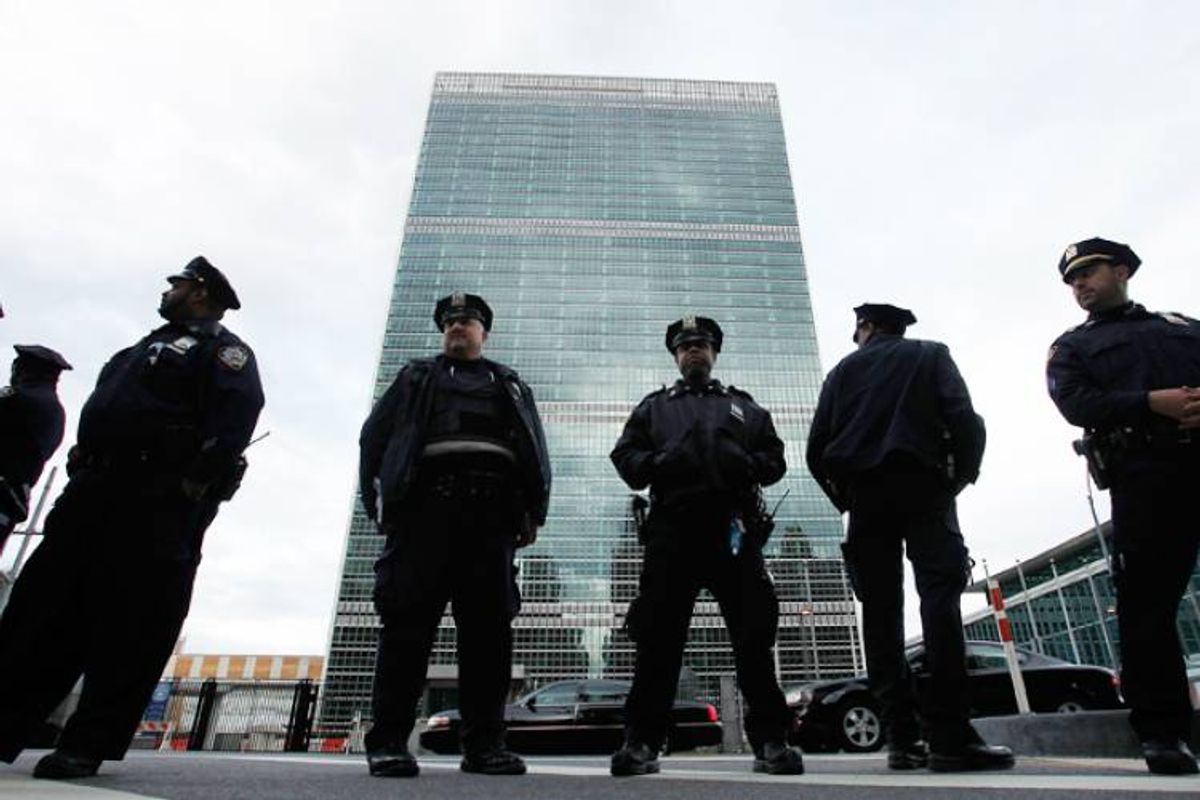If you’re catching a bus at New York’s Port Authority terminal and have to pee, it’d probably be better to brave the gross port-o-potty on the bus. According to a recent New York Times piece, in the past year police have arrested more than 60 men in the building’s second-floor bathroom on charges of “public lewdness,” mostly for masturbation — a sevenfold increase from last year.
Legal Aid lawyers representing a dozen or so arrestees say their clients were merely relieving themselves when an officer in plain clothes came up to the stall next to them, looked over and smirked. Next thing they knew, they were being carried away in handcuffs.
“I wore a leather jacket, fitted clothes. I guess that fits the description of a homosexual male,” one arrestee told the Times. “I was like, O.K., although I’m gay, I wasn’t doing anything.” For anyone who doubts the New York police are targeting gay men, the cops even have a nickname for the upstanding guy hitting on people in the bathroom: “the gay whisperer.”
New York’s chief of police acknowledges his agents aren’t targeting gay men because anyone is complaining. Rather, it’s on account of a law-enforcement strategy known as “broken windows” policing. Begun during the tenure of former Mayor Rudy Giuliani, it calls for law enforcement to aggressively prosecute innocuous quality-of-life infractions under the theory that small crimes lead to bigger ones. Together with New York Police Department arrest quotas, "broken windows" has led officers to enforce victimless, essentially harmless crimes to the point of harassment.
"Broken windows" has never been shown to conclusively prevent serious crime. What it does for sure is sow distrust between the police and their targets, in this case the gay community.
Let’s be honest: The Port Authority bathrooms are in fact known as a gay hookup spot. Cruising Gays, a hookup site, directs pleasure-seekers to the fourth-floor men’s room. The second floor, where the NYPD has set up its sting, isn’t recommended because its urinals have partitions; in order for officers to confirm that a suspect is masturbating, they’d have to lean over the divider to take a peek, which suggests police are doing more than just monitoring the bathrooms.
I’ll grudgingly admit that authorities have a right to enforce public-lewdness laws — being a liberal softie, I feel sorry for the closeted, older guys who rely on semi-public hookup spots for action — but quality-of-life infractions like riding a bike on the sidewalk or having one’s feet up on the subway seat are meant for passive enforcement. These and other trivial violations shouldn’t be such a large part of the NYPD’s business. And in this case, the numerous firsthand accounts from arrestees — and the fact that police are singling out guys they think look gay and flirting with them — suggests police are profiling gay men and arresting them simply for urinating.
NYPD policies incentivize false arrests. State law technically forbids arrest quotas, so instead the NYPD has set “goals” to evaluate their officers. Unsurprisingly, racial minority groups and LGBT New Yorkers are disproportionately the target of quota-meeting, "broken windows" policing; 86 percent of New Yorkers charged with misdemeanors so far this year were people of color. How could it be otherwise? Imagine the outcry if police started aggressively ticketing rich old ladies on the Upper East Side or finance types on Wall Street for jaywalking, which in this city is a way of life.
If you think about it, encouraging apprehensions is just the opposite of what a good police force should do. “If I help deliver a baby in an emergency, I get no credit,” one officer told the the Police Reform Organizing Project (PROP), a community group that monitors the NYPD. “But I score points if I issue a seat belt summons or record two stop-and-frisks.”
The election of liberal Mayor Bill de Blasio offers an opportunity to repair the damage "broken windows" and the quota system have done to the relationship between the NYPD and New Yorkers. When he took office in January, new Police Commissioner William Bratton promised to put an end to quotas, but a recent PROP report shows they are still being used.
Recent high-profile interactions between police and the public like the shooting of Michael Brown in Ferguson, Missouri, have sown the belief that police aren’t to be trusted. "Broken windows" and quotas targeted at minorities only add to this fear.

Shares